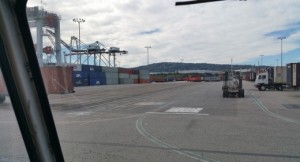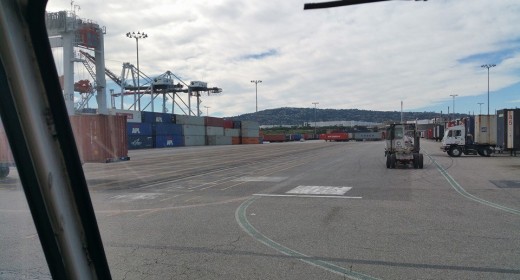 Talks to end the management-labor deadlock that has led to the months-long congestion at nearly 30 West Coast ports in the U.S. seem to have hit a wall.
Talks to end the management-labor deadlock that has led to the months-long congestion at nearly 30 West Coast ports in the U.S. seem to have hit a wall.
This as Pacific Maritime Association (PMA) said a port shutdown may be in the offing due to work slowdowns, and the International Longshore and Warehouse Union (ILWU) blasting the “threat” as “a reckless and unnecessary move.”
PMA CEO James McKenna has reportedly said West Coast seaports could experience a shutdown in the next five to 10 days and cripple U.S. trade with Asia if a contract deal is not reached soon.
PMA in an online statement dated February 4, 2015 said it has made an all-in offer “that would significantly increase compensation” to members of the ILWU in an attempt to restart stalled contract negotiations.
“Full-time ILWU workers already earn an average of $147,000 per year, and would see their wages rise roughly 3 percent per year, along with fully paid health care that costs employers $35,000 per worker per year.
“The maximum ILWU pension would rise to $88,800 per year as part of the proposed five-year contract,” said the statement.
PMA’s offer comes after nearly nine months of contentious discussions, and follows three months of ILWU slowdowns that have crippled major West Coast ports, cutting productivity by “as much as 30, 40, even 50 percent,” said McKenna.
The offer also meets ILWU’s two other demands, it said: maintain their Cadillac health benefits as well as keep their jurisdiction over maintenance and repair of truck chassis.
The resulting contract offer calls for a cost increase of roughly five percent each year over the life of the five-year contract, PMA said.
ILWU hits back
In response, ILWU international president Robert McEllrath on February 5 blasted the PMA for “threatening to shut down West Coast ports, bargaining in the media, and distorting the facts.””
“What the ILWU heard yesterday is a man who makes about one million dollars a year telling the working class that we have more than our share,” said McEllrath in an online release. “Intensifying the rhetoric at this stage of bargaining, when we are just a few issues from reaching an agreement, is totally unnecessary and counterproductive.”
“The employers’ threat to shut down West Coast ports is a reckless and unnecessary move,” continued McEllrath. “What the employers need to do is stay at the negotiating table and work through a few remaining issues with the workers who have made them successful for the past 80 years. We are very close to reaching an agreement.”
Labor slowdowns are now in their 14th week, impacting operations at major West Coast ports including Tacoma, Seattle, Oakland, Los Angeles, and Long Beach. Despite four weeks of participation by a federal mediator, the parties have not yet been able to bridge the gaps between them.
The ILWU and the PMA have been in contract talks since last May. Early this week rumors were circulating that the momentum for negotiations have once again stalled, as the tentative chassis deal could result in legal action from the harbor truckers. In the meantime, vessels and containers continue to back up.
The PMA is an employer association whose members include Maersk Line, Evergreen Marine, Hanjin Shipping, ICTSI, NYK Line, OOCL, and COSCO.
The International Longshore and Warehouse Union is based in San Francisco, and is negotiating a contract that has covered longshore workers at 30 West Coast ports in California, Oregon, and Washington since 1934.
Toy industry speaks
Meanwhile, the Toy Industry Association (TIA) said it continues to work with industry stakeholders, port directors, and U.S. and international government officials to discuss possible solutions to the ongoing, costly congestion issues at the West Coast ports.
TIA and several other trade associations recently met with White House personnel to discuss the White House’s involvement in clearing the congestion at the ports.
“We are hopeful that a resolution will be reached in the near future; however, we recognize that even after a contract is in place, it will take the ports months to get back to normal working order,” said Ed Desmond, TIA executive vice president of external affairs. “TIA will continue to advocate on this issue on behalf of the toy industry and seek solutions to alleviate costly port back-ups and delays even after a deal has been reached.”
Photo courtesy of ILWU





